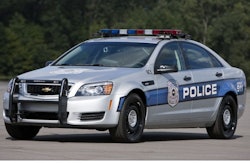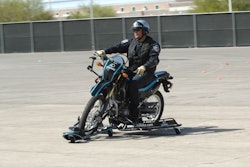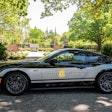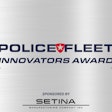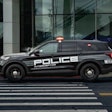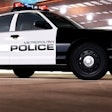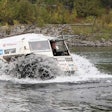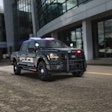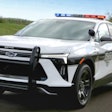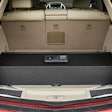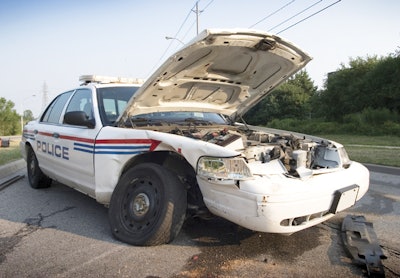 Photo courtesy of iStockphoto.com.
Photo courtesy of iStockphoto.com.
I quickly switched gears internally to "cop mode," and I prepared to take evasive action and get the license plate number of this possible impaired driver. Just as this car approached mine, I was shocked to see that it was a marked POLICE.
I looked at the officer, and I could see what he was doing that was causing him to swerve. He was looking at his in-car computer while trying to drive. I thought to myself, "What if he had struck another car? Hit a stationary object? Injured someone?" This officer and his agency would be liable for his distractions and behavior. This is unacceptable.
Technology's Downside
New technology has improved modern policing in many ways. During my career, I saw many changes, including the move from revolvers to semi-automatic handguns, from straight batons to PR-24s and collapsible batons, from Mace to O.C., from stun guns to TASERs, and from 12-gauge shotguns with ghost ring sights to AR-15s with holographic sights. That's just the evolution of weapons. On the safety equipment side, I have experienced the widespread adoption of concealable lightweight body armor.
When it comes to communications, we have seen our two-way car radios with multiple channel knobs replaced by digital, programmable screens supported by computer dispatch terminals and better radio towers with microwave technology and secure public safety bands. Our portable radios are smaller and more compact versions of the old "bricks" that used to adorn our duty belts. And of course we can now dispatch calls for service electronically directly to cars equipped with onboard computer systems.
Computers and Distraction
In-car computers are useful tools in law enforcement and public safety. They work great when you are not distracted and have time to read the information on the screen that is being sent to you. Computers are also useful when you want to conduct records checks on vehicles and individuals that you encounter.
In-car computer deployment was intended to make the job of a modern law enforcement officer easier in conjunction with other tools in the car. But it also created several safety concerns.
The people who first thought of adding computer displays to the cockpits of patrol cars probably thought they would be used by the passenger officer in two-officer units. Sadly, very few agencies now use two officers in a patrol unit, so the computer is read by the driver and that can lead to deadly multi-tasking.
We have statutes in many states against distracted driving, including texting while driving, talking on a cell phone, and other technological multi-tasking. So given the prevalence of in-car computers in patrol cars and how they are often used by an officer who is driving, we have to ask if the rules governing distracted driving apply to police officers as well as the public.
You may think that distracted driving laws are not your concern because after all, your job requires you to monitor that computer display. But if you are sued for causing a crash and you were glancing at the computer at the time, you can bet that plaintiff's attorney will argue that you were distracted, and your agency will be on the hook for a big judgment.
I think we can all agree that operating a police vehicle takes more training than the rest of the motoring public. Emergency vehicle operations courses (EVOC) are required for most basic police academy students before they can drive agency vehicles. EVOC is also a requirement for in-service training.
Some 25 to 30 percent of police officer line-of-duty deaths result from motor vehicle collisions. Many officers are also injured in traffic crashes. Technological distraction is becoming a common cause for these accidents.
Fixing the Problem
The best form of mitigation in any problem situation is to change the behavior through training and policy improvement. Supervisors, mid-level managers, and executives within your agency need to understand that managing your in-car computer involves risk management.
In the early '90s, I was a member of my agency's Accident Review Board. We had just started a pilot project with our neighboring agencies to evaluate early in-car computer systems. What our board found was an increased number of crashes by deputies who had computers in their patrol cars.
All the crashes we investigated during this period were ruled "avoidable" because the deputy did not have to take his or her eyes off the road while driving the vehicle. These deputies had other options. The primary option was to tell the dispatcher, "Broadcast the call." Yes, use the radio. Communicate with the dispatcher by radio, and you will get the same information and keep your eyes up on the road where they belong in emergency driving situations.
Communication policies for both patrol officers and dispatchers must unilaterally indicate that the in-car computer is a tool, but the primary communications between the officer in the field and the dispatcher will be two-way radio communications.
Supervisors monitoring and directing resources in "hot call" situations should insist that the officers close the computer screen down and drive safely to the call. Dispatchers need to broadcast live updates on the emergency calls, giving situation updates and timely information. Remember, you can talk faster than you can type.
Moving Forward
You should always be concerned with officer safety and information security. With the increasing use of encryption, the two-way radio channels available to public safety agencies make the technology more secure, so you don't need to worry about "scanner land" in many instances for officer safety. The radio is still your friend.
The technology that has been developed over the past few decades makes your job easier. And the in-car computer, when used properly, is a great boon to officer safety. But we have to ensure that we are arriving safely to the call for service and that we are not creating a safety problem for the public that we serve. When in doubt, pick up the microphone and close the computer screen.
Mark D. Reese is a retired sergeant from the Lane County (Ore.) Sheriff's Office. He has held assignments in patrol, corrections, special operations, and as an active field training officer.




